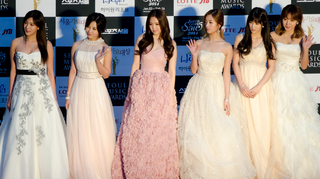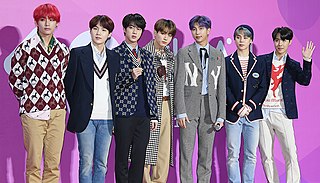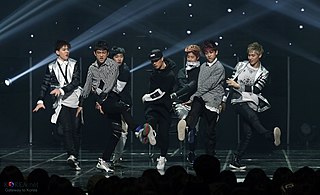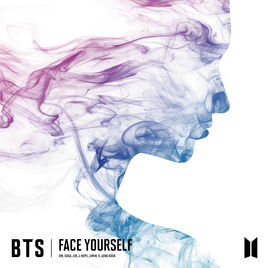Related Research Articles
J-pop, natively also known simply as pops, is a musical genre that entered the musical mainstream of Japan in the 1990s. Modern J-pop has its roots in traditional Japanese music, but significantly in 1960s pop and rock music, such as The Beatles and The Beach Boys, which led to Japanese rock bands such as Happy End fusing rock with Japanese music in the early 1970s. J-pop was further defined by new wave groups in the late 1970s, particularly electronic synth-pop band Yellow Magic Orchestra and pop rock band Southern All Stars.
Mai Kuraki is a Japanese pop and R&B singer-songwriter and producer. Kuraki debuted in 1999 with the single, "Love, Day After Tomorrow". In 2000, she released her debut album, Delicious Way, which debuted at number-one and sold over 2,210,000 copies in its first week. Kuraki is one of a few female artists in Japan to have their first four studio albums to debut at top of the Oricon album chart.
Toshinobu "Toshi" Kubota is a Japanese singer, songwriter, musician, music producer, and radio personality. Toshinobu Kubota has produced six million-seller records and thirty-three Top 40 singles during his career. He is currently part of Sony Music Japan. In addition, Kubota has composed and written songs for many singers including Iwasaki Hiromi, Misia, Toshinori Yonekura, Koizumi Kyoko, and many other recording artists.

Kumiko Kōda, known professionally as Koda Kumi, is a Japanese singer from Kyoto, known for her urban and R&B songs. After debuting with the single "Take Back" in December 2000, Koda gained fame in March 2003 when the songs from her seventh single, "Real Emotion/1000 no Kotoba", were used as themes for the video game Final Fantasy X-2. Her popularity grew with the release of her fourth studio album Secret (2005), her sixteenth single "Butterfly" (2005), and her first greatest hits album Best: First Things (2005), reaching the number-three, number-two, and number-one spots respectively.
Oricon Inc., established in 1999, is the holding company at the head of a Japanese corporate group that supplies statistics and information on music and the music industry in Japan. It started as Original Confidence Inc., which was founded by Sōkō Koike in November 1967 and became known for its music charts. Oricon Inc. was originally set up as a subsidiary of Original Confidence and took over the latter’s Oricon record charts in April 2002.

South Korean boy band Big Bang have released twenty-seven concerts video albums, forty music videos, four music video compilations, and one documentary DVD. The group has sold over a million physical DVDs/Blu-rays in Japan.

CNBLUE is a South Korean pop rock band formed in 2009. The band consisted of Jung Yong-hwa, Lee Jong-hyun, Kang Min-hyuk (drums), and Lee Jung-shin (bass). First bassist Kwon Kwang-jin left the band after they released their debut Japanese extended play Now or Never in 2009, and was replaced by Lee Jung-shin.
The Neon Genesis Evangelion franchise has had various soundtracks, remix albums and compilations released around it. The franchise has sold more than 9 million albums and singles.
Michiyo Heike, is a Japanese pop singer-songwriter and singer from Osaka Prefecture and raised in Nabari, Mie. She first become known after her appearance on the Japanese talent show Asayan in the late 1990s, becoming the first member of the future "Hello! Project". Heike currently goes by the mononym Michiyo.

South Korean girl group Apink has released six studio albums, eight extended plays, three compilation albums, and twenty-nine singles. The group debuted in 2011 and consists of six members: Chorong, Bomi, Eunji, Naeun, Namjoo, and Hayoung. Former member Yookyung left the group in April 2013.
The Oricon Albums Chart is the Japanese music industry standard albums popularity chart issued daily, weekly, monthly and yearly by Oricon. Established on October 5, 1987, the chart rankings are based on physical albums' sales. Oricon did not include download sales up until its establishment of the Digital Albums Chart on November 19, 2016.
The Oricon Singles Chart is the Japanese music industry standard singles popularity chart issued daily, weekly, monthly and yearly by Oricon. Chart rankings are based on physical singles' sales. Oricon does not include download sales. In Japan, physical sales decreased sharply in the 2000s, while download sales hit three to four times the amount of single sales.

South Korean boy group BTS have released six studio albums, four compilation albums and five extended plays.

Got7, a k-pop boy group based in South Korea, have released three studio albums, eleven EPs, twenty singles, and two box sets. Formed by JYP Entertainment in 2013, Got7 made their debut in January 2014 with the EP Got It?, which debuted at number two on the Gaon Albums Chart. The EP's lead single "Girls Girls Girls" peaked at number 21 on the Gaon Singles Chart. In October 2014, Got7 debuted in Japan with their first Japanese-language release "Around the World", peaking at number three on the Oricon's singles charts. A month later, Got7 returned to Korea to release their first full-length album Identify, and topped the albums chart.

The Best of Big Bang is the sixth greatest hits album by the K-pop boy band Big Bang. It was released on November 26, 2014 via YGEX.

South Korean boy band iKon released two studio albums, two EP, one compilation album, one live album, one single album and fifteen singles.

UP10TION is a South Korean boy band formed by TOP Media in 2015. The group consists of ten members: Jinhoo, Kuhn, Kogyeol, Wei, Bitto, Wooshin, Sunyoul, Gyujin, Hwanhee, and Xiao. The group debuted with an extended play (EP) Top Secret. In 2017, they made their Japanese debut with EP ID.

South Korea-based girl group Twice have released two studio albums, two compilation albums, four reissues, six extended plays, one compilation extended play, and seventeen singles. Formed by JYP Entertainment in 2015 through the survival show Sixteen, Twice debuted in October 2015 with the release of their first EP, The Story Begins, and its single "Like Ooh-Ahh".

Face Yourself is the third Japanese studio album by South Korean boy band BTS. It was released on April 4, 2018. It contains Japanese versions of songs previously released on their 2016 Wings album and 2017 Love Yourself: Her EP, as well as three brand new, original Japanese-language tracks: "Don't Leave Me", "Let Go", and "Crystal Snow". Its debut at number 43 on the Billboard 200 made it the third-highest-charting Japanese album in the history of the chart.